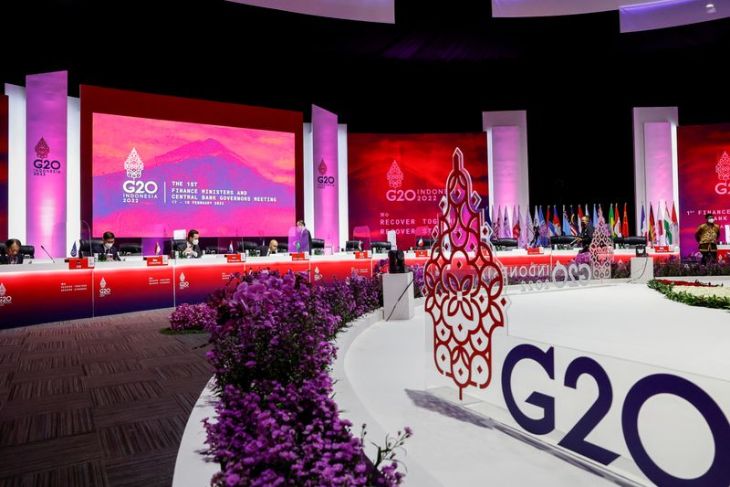(雅加达讯)乌克兰战争加剧全球能源价格上涨,二十国集团轮值主席国印度尼西亚将以能源安全作为会议议程的重点探讨议题之一。

印尼是今年二十国集团(G20)的轮值主席国。印尼经济事务统筹部办公室指出,G20第一轮协调工作组将把重点放在能源安全议题上。
印尼副经济统筹部长兼G20协调员艾迪(Edi Prio Pambudi)周一在记者会上说,将能源安全列入议程是有必要的,以确保适当应对当前的挑战。
G20峰会将于11月在峇厘岛举行。
印尼此前计划专注于三大主题:加强全球医疗保健架构、数码化转型及能源转型。
艾迪说,随着能源安全列入议程,“意味着我们在讨论能源议题时,不仅是谈能源转型,也要谈能源安全。这个问题不能在短期内获得解决。”
他透露,受到俄乌战事影响,一些G20成员国正考虑将投入到能源转型的一大部分预算,重新分配到能源补贴方面。
根据印尼统计局的数据,原油价格同比上涨64.28%至每桶103.4美元(约142新元),天然气价格则暴涨三倍至每百万英热单位(mmBtu)32美元(约44新元)。
俄乌战争引发经济制裁 是能源价格上涨的主因
由于能源价格持续上涨,作为G20主席国的印尼必须平衡能源转型与能源安全议题的谈论。
艾迪坦言,美国和盟国对俄罗斯实施了经济制裁,地缘政治也妨碍了有关能源转型的讨论。他说,能源价格上涨不是因为没有库存,而是因制裁不能出售。他认为,即使战争停止,制裁也不一定会解除。
雅加达智库基本服务改革研究所主管法比(Fabby Tumiwa)周二接受《雅加达邮报》访问说,在G20的讨论中更加侧重能源安全是可以理解的,因为印尼必须考虑到成员国的经济关注。
此外,印尼G20协调秘书处周一也发布了第一轮协调工作组的进度报告。
能源转型探讨三大支柱
其中,能源转型工作组的报告指出,所有代表团都同意能源转型的三大支柱:保障能源的获取、扩大智能和清洁能源技术,以及推进能源融资。
相关议题的进一步讨论将于6月23日及24日在东努沙登加拉省的科莫多岛城镇纳闽巴霍(Labuan Bajo)举行。
Jakarta - Indonesia, chair of the Group of 20 (G20) nations, will put energy security at the top of its agenda as the war in Ukraine worsens global energy prices.
Indonesia holds the rotating presidency of the Group of 20 nations this year. The office of Indonesia's Coordinating Ministry for Economic Affairs said the first round of G20 coordination working groups will focus on energy security issues.
Edi Prio Pambudi, Indonesia's deputy coordinating Minister for the economy and G20 coordinator, said at a news conference Monday that adding energy security to the agenda was necessary to ensure an appropriate response to the current challenges.
The G20 summit will be held in Bali in November.
Indonesia had planned to focus on three themes: strengthening the global healthcare architecture, digitization and energy transformation.
With energy security on the agenda, Eddy said, "it means that when we talk about energy, we don't just talk about energy transition, we talk about energy security. This is not a problem that can be solved in a short period of time."
He said some G20 members were considering reallocating a large part of their budget for the energy transition to energy subsidies because of the war in Russia and Ukraine.
Crude oil prices rose 64.28 per cent year-on-year to US $103.4 (S $142) a barrel, while natural gas prices quadrupled to US $32 (S $44) per million British thermal units (mmBtu), according to Indonesia's statistics agency.
The economic sanctions caused by the Russia-Ukraine war are the main cause of the increase in energy prices
As energy prices continue to rise, Indonesia, as chair of the G20, must balance discussions on energy transition with energy security.
The United States and its Allies have imposed economic sanctions on Russia, and geopolitics have stymied discussions about the energy transition, Mr. Eddy acknowledged. He says energy prices are rising not because there are no stocks, but because sanctions prevent them from being sold. He believes that even if the fighting stops, sanctions will not necessarily be lifted.
Fabby Tumiwa, director of the Institute for Basic Services Reform, a Jakarta-based think tank, told the Jakarta Post Tuesday that a greater focus on energy security in G20 discussions is understandable, as Indonesia has to take into account the economic concerns of its members.
Separately, the G20 Coordination Secretariat in Indonesia on Monday released a progress report on the first round of coordination working groups.
Three pillars of the energy transition
According to the Report of the Energy Transition Working Group, all delegations agreed on the three pillars of the energy transition: securing access to energy, expanding smart and clean energy technologies, and advancing energy financing.
Further discussions will be held in Labuan Bajo, a town on Komodo Island in East Nusa Tenggara Province, on June 23 and 24.